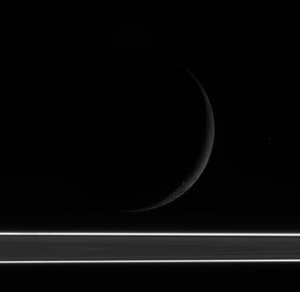After 7+ years of orbiting Saturn, the Cassini spacecraft is still knockin’ ‘em out of the park. On October 19 it swung by the icy moon Enceladus, taking dozens of amazing images of the little world. When it was 65,000 km (40,000 miles) away, it took this shot, right out of Star Wars:
[Click to DeathStarenate.]
That’s not a laser blasting out from the moon; it’s actually Saturn’s rings seen in the background! At the moment this was taken, Cassini was nearly in the same plane as the huge ring system circling Saturn, and so they’re seen edge-on, looking like a bright line. The Sun is off to the right, illuminating Enceladus, which from this angle makes it a lovely crescent. Normally, Enceladus looks really bright since its surface is icy and very reflective, but in this case the short exposure downplays its shininess.
 The rings, though, are made of small particles, and when illuminated tend to throw that light forward (much like a wet road surface reflects oncoming headlights very strongly toward you). The sunlight scatters off the rings and gets bounced at the camera, making them look very bright.
The rings, though, are made of small particles, and when illuminated tend to throw that light forward (much like a wet road surface reflects oncoming headlights very strongly toward you). The sunlight scatters off the rings and gets bounced at the camera, making them look very bright.
As Cassini orbits Saturn its position relative to the moons and rings changes, and so within a short period of time of the show above it got this one, inset here, where the geometry is slightly different. I think we’re looking up from underneath the rings, so the bottom line is the far side of the rings, the upper line the near side, and then Enceladus. Both arcs and the moon are in the same plane, so if you picture it this is the only way this lineup makes sense! This image also shows a different view.
I found those images going through the Cassini raw images archive. I found something else, too… but that’ll have to wait for the next post. Stay Tuned!
Image Credit: NASA/JPL/Space Science Institute
Related posts:
- Watch out, Titan! Vader’s onto you!
- Midnight on a ringed world
- Enceladus on full afterburner
- Enceladus sprays anew!
- Saturn weather forecast: rings, with light rain from Enceladus